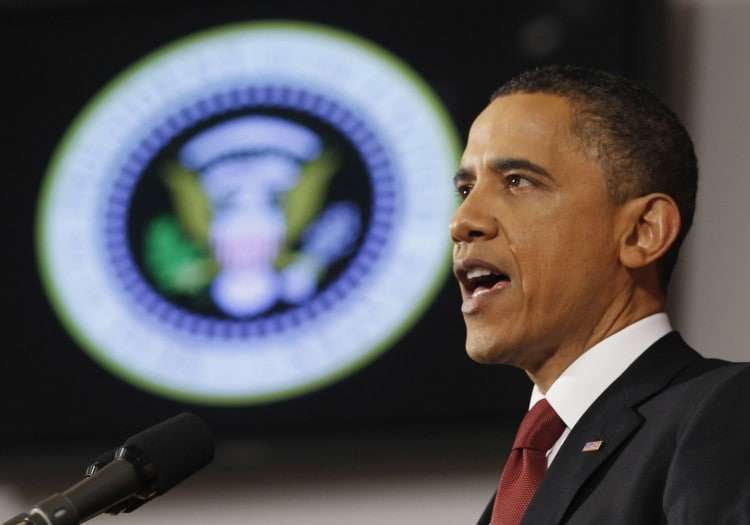The Volokh Conspiracy
Mostly law professors | Sometimes contrarian | Often libertarian | Always independent
Obama admits that his handling of the Libya war was his worst mistake - but not that it was unconstitutional

In a recent interview with Fox News, President Obama admitted that the handling of the 2011 military intervention in Libya was his "worst mistake":
President Barack Obama said the worst mistake of his presidency was a lack of planning for the aftermath of the 2011 toppling of Libyan dictator Moammar Gadhafi.
"Probably failing to plan for the day after what I think was the right thing to do in intervening in Libya," he said in a Fox News interview aired Sunday.
In a profile published last month in The Atlantic, the President told author Jeffrey Goldberg that British Prime Minister David Cameron became "distracted by a range of other things" after the operation. Cameron, along with former French President Nicolas Sarkozy, took the brunt of Obama's criticism. Although Obama said he thinks the intervention went as well as it could, he views Libya today as a "mess."
Privately, according to the article, he refers to the troubled state as a "sh*t show."
In the Atlantic interview, Obama spoke about the Libya intervention at greater length, and argued that much of the blame belongs to the British and French, who failed to follow through as Obama expected them to. But, obviously, US policy was also at fault, since the president should not have been surprised by the possibility that the allies might cut and run if it became convenient for them to do so, and the the US did not make much effort to prevent it.
Obama's willingness to even partially admit an important mistake (something few political leaders do) is commendable. But it is unfortunate that he still refuses to admit that the Libya war was illegal, as well as badly managed. Because the administration failed to get congressional authorization for the conflict, the war violated both the Constitution (which requires congressional authorization to initiate war), and the 1973 War Powers Act. Then-Senator Obama put it well back in 2007, when he stated that "[t]he President does not have power under the Constitution to unilaterally authorize a military attack in a situation that does not involve stopping an actual or imminent threat to the nation." That describes the Libya war to a T.
The administration's argument that the Libya conflict was not a real war (or even a case of "armed hostilities" covered by the War Powers Act) because "U.S. operations [in Libya] do not involve sustained fighting or active exchanges of fire with hostile forces," does not even pass the laugh test. You don't have to be a legal scholar to understand that launching numerous air strikes for the purpose of overthrowing a government qualifies as war, and certainly as "armed hostilities."
The illegality of the war was not unrelated to the resulting "sh*t show," which Obama himself now decries. Because the administration did not bother to get congressional support and otherwise secure a broad public consensus in favor of the intervention, it sought to minimize political risk by ending the US military role as quickly as possible. That predictably created a power vacuum, which has since been exploited by radical Islamists and others who may be as bad or even worse than the brutal Gadhafi regime we helped overthrow. If Obama had obeyed the Constitution and the War Powers Act, we might either have stayed out of Libya entirely, or made a larger-scale effort more commensurate to the task at hand. Either would likely have been better than the administration's strategy of intervening while minimizing political exposure by pretending it wasn't a real war.
These painful lessons of the Libya war are directly relevant to the administration's current similarly illegal war against ISIS. It too violates both the Constitution and the War Powers Act - and for much the same reasons as the Libya intervention. Although the fighting has now gone on for almost two years and has expanded to include US ground forces, the administration has so far failed to get the legally required congressional authorization. Last year, it did briefly float a badly flawed draft authorization for the Use of Military Force that got little traction with either Democrats or Republicans. Obama also passed up an opportunity to legalize the war and bolster political support for it by invoking Article 5 of the North Atlantic Treaty.
In the Atlantic interview, the president suggested that winning the war against ISIS is "his most urgent priority for the remainder of his presidency." But so far, at least, his handling of the conflict has disturbing parallels to the flawed strategy adopted in Libya. In both cases, the administration deployed enough force to get the US involved in the conflict, but not enough to ensure success. Both failures to secure a broad political consensus in favor of the intervention created incentives to minimize short-term political risk by strictly limiting the scope of US action. That has the virtue of minimizing US casualties; but it also increases the risk of failure.
With both Libya and ISIS, flouting the Constitution was not only bad in itself, but has also greatly increased the risk of a tragic outcome on the ground, one that is likely to cost the lives of many innocent people. Sadly, the resulting "mess," as Obama calls it, may well be left for the next president to clean up.


Show Comments (0)